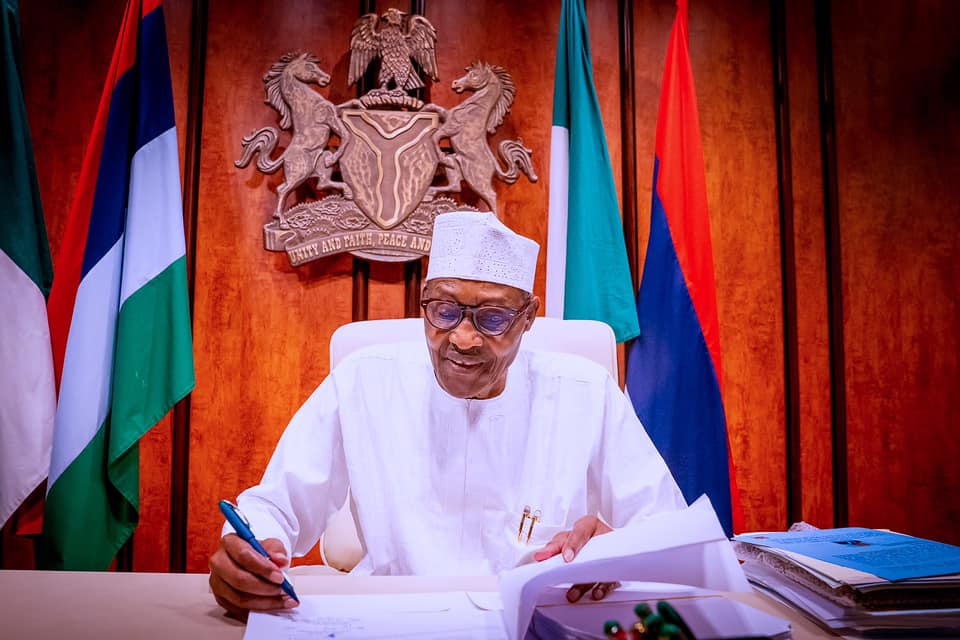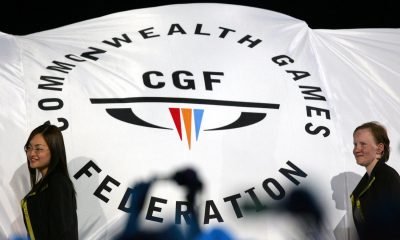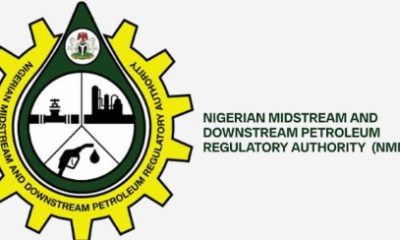Business
Nigeria: Odds against export-led growth policy
Published
4 years agoon
By
Publisher
By Marcel Okeke
The Central Bank of Nigeria really deserves some commendation for being so prolific in churning out ‘intervention policies’ in practically all sectors of the Nigerian economy, the latest being the one it says is aimed at re-introducing and driving ‘export-led’ economic growth and development of the country. Governor of the apex bank, Mr. Godwin Emefiele, while speaking at a recent seminar for finance correspondents and business editors in Akure, Ondo State, announced the new initiative which he called “Produce, Add Value and Export (PAVE). According to him, the new scheme is “designed to be the key for fast-tracking a bucket of substitutes to crude oil export which again is expected to encourage backward integration for the local production of select items.”
The PAVE, which is shaped after business models of fast-developing economies in Asia, he said, “is expected to make Nigerians consume what they produce, add value to it, and even export the surplus,” adding that the new initiative was akin to South-East Asia’s “much referenced export-led industrialization policy which changed the economic fortunes of countries such as South Korea, Taiwan, Malaysia and Singapore.” And this is where the task of attaining the intentions of the PAVE becomes herculean; that is, first, “making Nigerians consume what they produce”; and second, “adding value” to their produce; and third, “export the surplus”.
A dispassionate consideration of these objectives will show that there is really nothing new about them, except the new acronym and the re-statement of the determination to pursue them. Over and over again, Nigeria has tried but failed woefully to make Nigerians consume what they produce. Successive administrations (military and civilian) have come up with initiatives to tame Nigerians’ rabid taste (and preference) for foreign goods to no avail. This consumption pattern (in favour of imported goods) even when there are available local substitutes has constituted a drain on the foreign exchange (forex) earnings of the country. A huge chunk of the nation’s forex that should have built up its stock of external reserves is usually gulped by unrestrained importation of foreign goods to meet local tastes. It is therefore doubtful if the apex bank possesses any magic wand this time around to enforce ‘lifestyle change’ on Nigerians, especially the high propensity for conspicuous consumption.
In 2015, the CBN excluded importers of 41 items, including some food products, from accessing forex at the official window of the foreign exchange market in a “bid to conserve the external reserves as well as encourage local production of those items.” Now, almost seven years down the line, it is apposite to showcase the gains (if any) from the fate of the 41 items. Are those items truly being produced locally here in Nigeria? Or, did the affected companies ‘beat the system’ to keep accessing forex (even through dubious bureaux de change)? Or, have some of the affected concerns closed shops; or relocated outside Nigeria as many are known to have done? And so on.
In denying the 41 items access to forex to “conserve the external reserves as well as encourage local production of those items”, the apex bank unwittingly attempted an ‘import substitution’ industrialization policy. Indeed, had the policy been comprehensively packaged as an integral part of an overarching development plan, producers of those 41 items would have been ‘nurtured’ to stability and ‘maturity’. However, the forex measure was a ‘stand-alone’ policy to ‘whip’ those businesses into line. Denial of official access to forex should have been accompanied by other incentives to attenuate the sudden ‘harsh’ policy. But that was not the case; rather, those businesses were allowed to be scorched by their ‘new reality’.
Now, PAVE is intended to fast-track the elimination of almost-sole- dependence on crude oil exports for forex earnings by Nigeria. This is to be achieved through value addition (that is, processing) to local primary produce; consumption of such local products, and export of the ‘excess’. So, the ultimate goal is to fast-track manufacturing on such a scale as to meet local demand/consumptionand have surplus for export market. This, from all indications, is ‘export-led’ economic diversification/industrialization strategy. But beyond the ‘beautiful’ paper work, as done by the apex bank, is the Nigerian business environment conducive to manufacturing (i.e. ‘value addition’ or processing) to the point of substantial export?
The environment has almost always been hostile: marked by forex liquidity concerns (more so, these days); policy somersaults; weak consumer power; tattered infrastructure, etc. Today, more than ever before, the state of basic infrastructure in Nigeria remains awful. Epileptic power supply has deteriorated to almost total collapse of the national grid—leading to lingering blackout nationwide. Yet, tariff for electricity has been raised several times in recent months (both for industrial and domestic users). Operators in the manufacturing sector have almost been choked out of their businesses by scarcity of refined petroleum products (diesel, Premium motor spirit, kerosene, etc.). Where and when these fuels are available, their prices are sky-high; thus, driving cost of business to uncompetitive levels. High costs of other essential inputs and raw materials, especially imported ones, are getting scary.
Multiplicity of taxes and levies remain nightmares to business entities in the country, especially operators in the manufacturing sector where, apart from regular taxes, many of their products are still subjected to excise duties and assortment of levies. All these usually result in prices of those goods being fixed at levels beyond the reach of the average consumer; and also make them uncompetitive vis-à-vis their imported counterparts. The ports and other export points in Nigeria operate in ways that frustrate prospective exporters; their weird processes, proceduresand red tape are rather dreadful to not a few exporters—big and small. Quality approvals and standards gauging and maintenance procedures are anything but reliable.
It is no longer news that often times, exports from Nigeria have been rejected at their countries of destination—and left to waste or rot away—for being substandard. Something is therefore certainly wrong with the country’s quality/standards gauging and enforcement procedures—that allow such products leave the shores of the nation. Has there been any improvement in all of these, to facilitate the fast-tracking of exports to supplant inflow from crude oil exports—as envisaged under PAVE?
Beyond all these, Nigerians are today facing the worst existential challenge ever. Insecurity of life and property is heightening by the day: no economic agent is immune. Indeed, many companies in certain locations in the country have closed shops (some, temporarily) just to ensure the safety and security of their staff. No mode of transportation guarantees safety anymore; rail lines are being bombed by bandits incessantly; airports are being attacked; commuters are being kidnapped in large numbers on a daily basis. Criminality is commonplace; social upheavals are widespread, and law and order seem kept in abeyance. In this milieu, local investors are scared stiff; foreign direct investment has thinned out; and many companies have resorted to providing skeletal services or on the verge of fleeing the country. It therefore looks somewhat specious that the apex bank is operating entirely in its ‘silo’, oblivious of the threatening stack realities of the country. But, really, darkness leads to nowhere!
You may like


Nigeria Declares Readiness to Host 2030 Commonwealth Games


BREAKING: The Head of Service of the Federal Capital Territory (FCT), Grace Adayilo is dead


Nigeria, Switzerland begin talks on artefact repatriation and cultural cooperation


El-Rufai rules out 2027 ambition, Says He’s back to mentor youth, Support credible leadership


NMDPRA – Nigerians spend N1.3tn on petrol in June amid soaring energy costs


Pastor Adefarasin: Nigeria was born of British greed, Not God’s design
Trending

 Health1 week ago
Health1 week agoDeclassified CIA memo explored concealing mind-control drugs in vaccines

 Latest1 week ago
Latest1 week agoFubara pledges collaboration with APC lawmakers after Rivers by-elections

 Health7 days ago
Health7 days agoGroups launch ‘COVID Justice’ campaign, urge U.S. Senate to adopt accountability resolution

 Football7 days ago
Football7 days agoJuventus prepare €120m bid for Osimhen as summer rebuild plans gather pace

 News1 week ago
News1 week agoFamily demands coroner’s inquest into death of Chimamanda Adichie’s son

 Latest1 week ago
Latest1 week ago2027 race: ADC battles setbacks, arrests, internal strains as opposition fortunes waver

 News1 week ago
News1 week agoMother, son escape death as Lexus SUV overturns three times in Lagos

 Latest1 week ago
Latest1 week agoOkpebholo condemns attack on ADC members, vows to keep Edo peaceful

